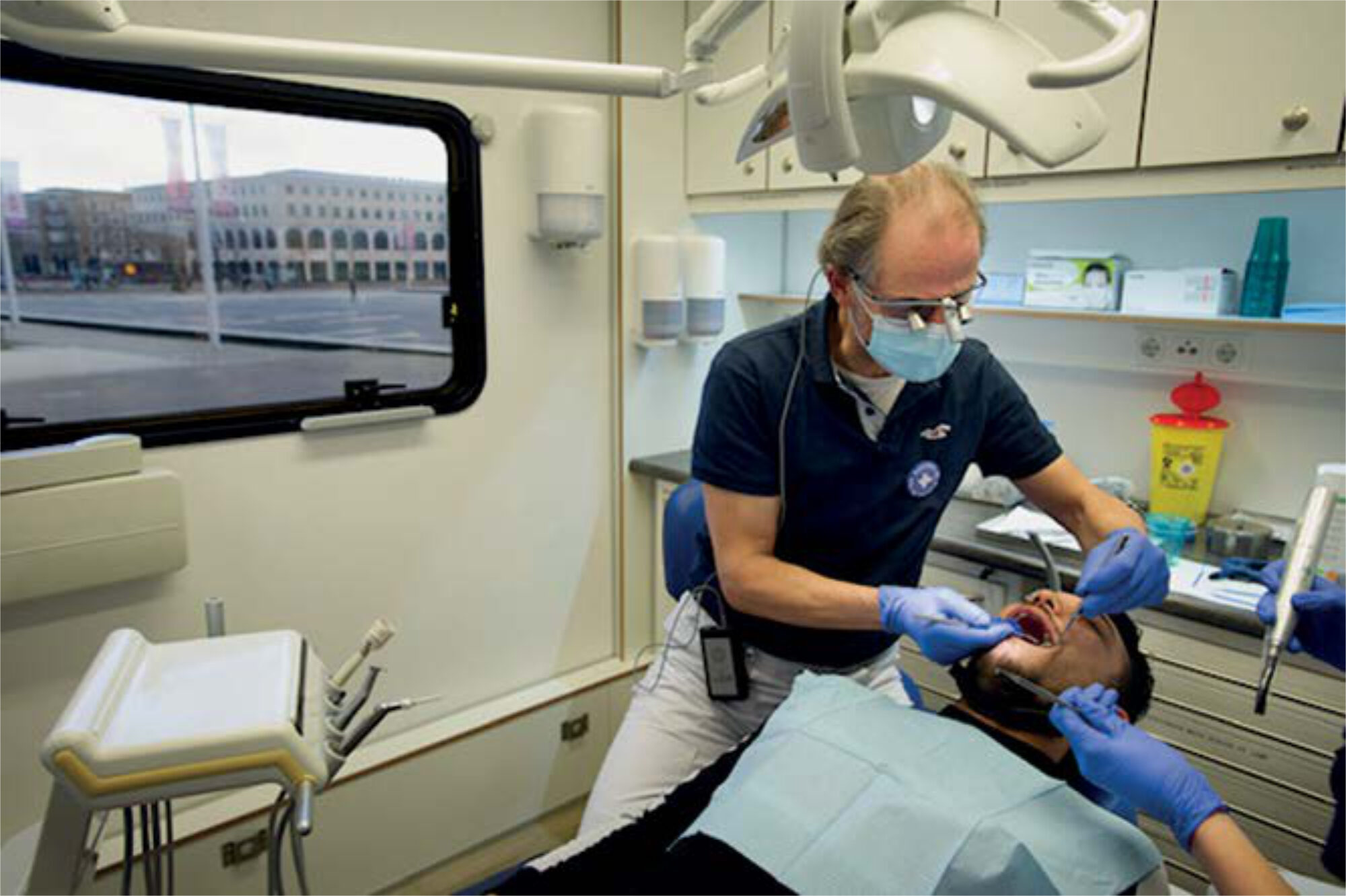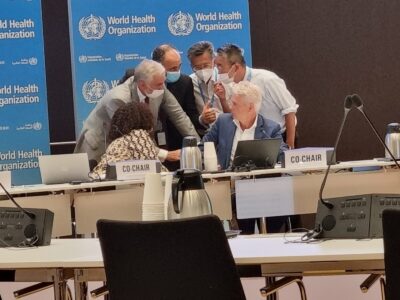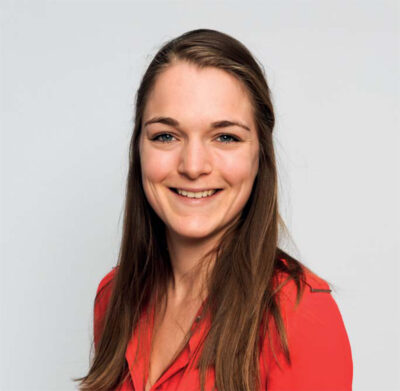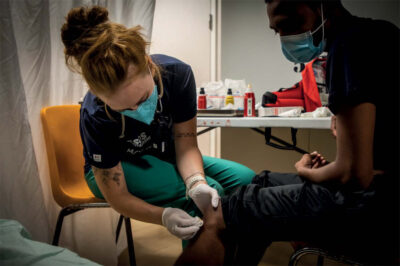Main content
Oral health is one of the many areas of health where certain population groups are unequally and unfairly at risk. Asylum seekers, refugees, migrant workers from Eastern Europe, undocumented people, and Dutch citizens with lower socio-economic status are, once again, the ones most at risk, both physically and financially.
Xander Meijs, dentist in a group clinic in Twente, is often confronted with the poor outcomes of oral health that certain people within the Netherlands endure. Besides his work in the clinic in Twente, he regularly participates in oral health care activities organised by the NGO Doctors of the World.[1] “For me the reason to become involved in oral care for marginalised groups was the realisation that refugees who were placed in our municipality often had difficulty finding the proper routes for getting adequate oral health care. I became involved in volunteering for Doctors of the World in 2019, when the organisation launched a petition demanding inclusion of oral health care in basic health insurance.”[2] Meijs now participates six times a year in the ‘Mondzorgkaravaan’, loosely translated the ‘Oral Care Convoy’, which consists of two mobile clinics: a fully instrumented dentist clinic and a prevention clinic.[3] The mobile clinics tour the Netherlands and provide free oral health care and instructions to anybody who comes to the clinic. Besides his work with Doctors of the World, Meijs has several methods to integrate oral care for these groups in his own clinic.
Oral care in the Netherlands
“It is a weird phenomenon that oral health care in the Netherlands is not covered by basic health insurance,” says Meijs. Patients above 18 years old need additional insurance to be reimbursed for oral care and almost all (preventive) treatments, and then still for only part of the costs.[4] Meijs: “The costs of oral treatments and procedures and the costs of additional insurance have increased over the years, but the reimbursement that additional insurance offers has not kept pace.” Children until 17 years of age receive free oral health care, but orthodontist care is excluded from this. Refugees, i.e. people who have been granted asylum, are in the same category as Dutch citizens in that they are obliged to have health insurance and therefore the same reimbursement (or rather lack thereof) regulations apply to them. Asylum seekers only have access to limited acute dental care with a maximum cost of 350 euros per year.[5] Theoretically, migrant workers have their own health insurance from their country of origin.
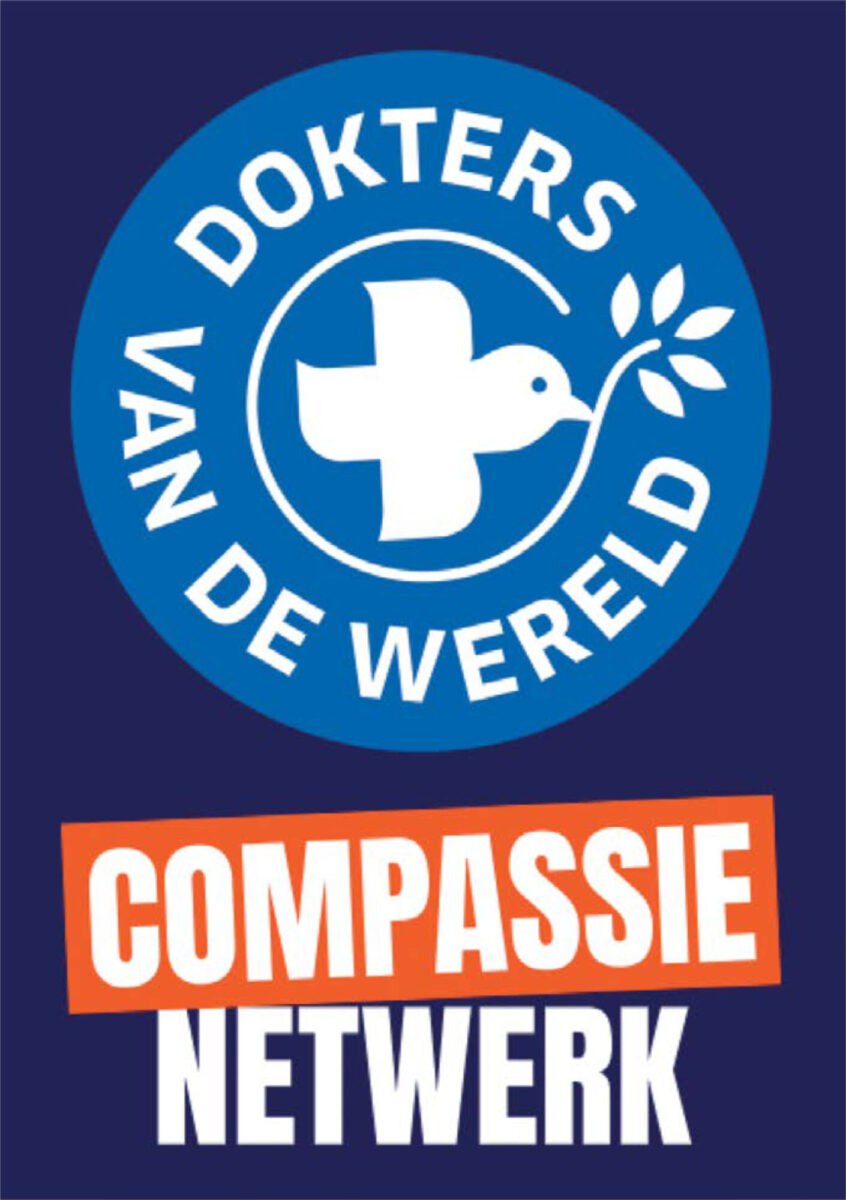
Vulnerable groups
Meijs again: “Refugees and asylum seekers are often not used to the Dutch system of oral care. Regular check-ups every half year is something that many refugees or asylum seekers have never had access to in their lives. Also basic oral hygiene practices such as regular tooth brushing were often not part of their daily routine. This is the reason why these groups have more complications, needing expensive treatment. “Untreated cavities, sometimes up to the gums, is what I mostly see. Sometimes the tooth cannot be saved and needs to be removed to prevent further infection. Sometimes an expensive root canal treatment is necessary. Prevention would have been much more cost-effective, as the oral health problems presented by them require more expensive treatment.” In addition to high costs, access to Dutch oral healthcare is often hindered by language barriers which, for example, make getting an appointment and getting there at the right place and time more difficult.
Meijs points out another vulnerable group he often encounters: young adults recently turned 18 who often have received extensive support and guidance through youth care, and now have to organise everything themselves. Around this age, wisdom teeth often start being a problem, and these young adults are all of a sudden faced with high dental costs in addition to their deductible when they go to the dental surgeon. “This might be an added reason why some of them are pushed towards debt at a young age.”
Homeless people and undocumented people “who sometimes have been in the Netherlands for years already,” are other groups Meijs often encounters with less access to adequate oral care and therefore more complications. Also seasonal migrant workers, the people who pick our vegetables for low wages, are at risk: “Nothing is organised for them. One of my assistants has a family member who has some migrant workers from Romania working for him. Every year some of them come with acute dental problems. I just do the treatment for free then.”
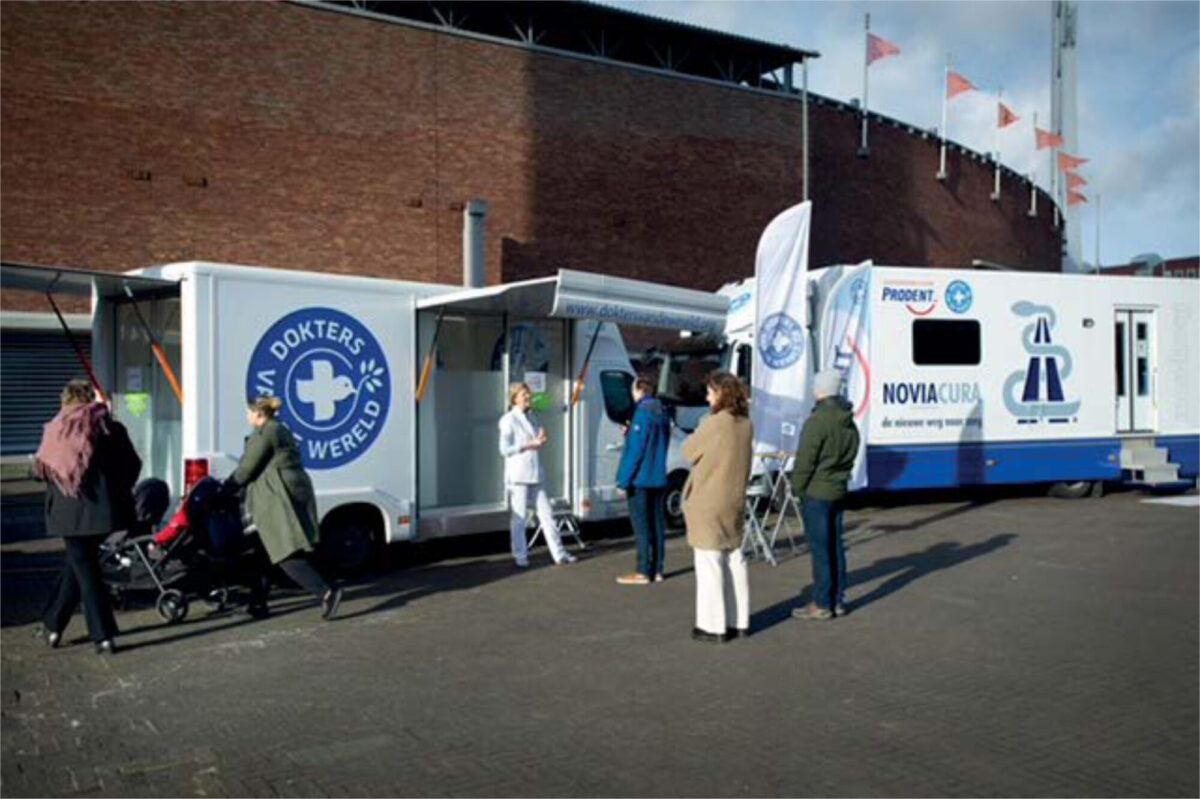
Initiatives for improving access
“A buddy system, in which a refugee or asylum seeker is taken along by someone else to an oral health care appointment, is a possible solution to increase their access to adequate oral care.” This ‘someone else’ might be a former asylum seeker. “In this way they can be guided through making appointments and dealing with invoices, and can become used to the Dutch system of planning ahead for regular check-ups.”
Meijs also participates in the “Compassie Netwerk”, an initiative by Doctors of the World in which participating oral health clinics provide minimally 10 treatments per year free of charge to people who have trouble paying the costs.[6] “Unfortunately, dentists’ involvement in the care for these groups is low in the Netherlands. Interestingly, Dutch dentists who themselves have a multicultural background are more often involved.” Unfortunately, the aforementioned petition has not yet brought about any significant political change, while it has already been signed more than 300,000 times. Meijs sees an important role for the Dutch patient foundation, the ‘Nederlandse Patienten Consumenten Federatie’ (NPCF). “They should be standing up for adequate access to quality oral care.”
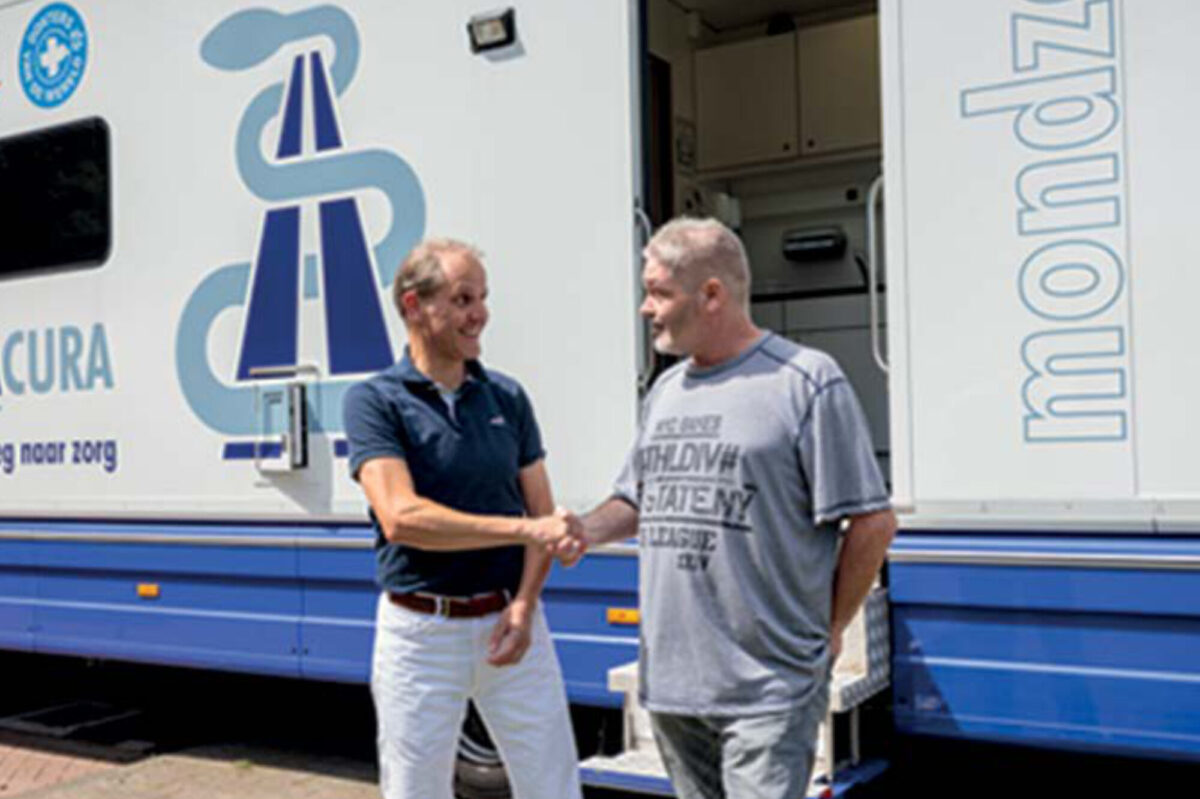
Towards equitable oral care for all
People new to the Netherlands, be they asylum seekers, refugees, migrant workers, or undocumented people, often deal with worse oral health conditions resulting in higher costs. The current system of limited reimbursement increases the already existing health inequities within a high-income country such as the Netherlands. Oral care should be included in basic health insurance, and should be accessible to all people in the Netherlands, regardless of legal status.
References
- Dokters van de Wereld. Compassie Netwerk. [Internet]. Available from: https://doktersvandewereld.org/projecten/compassie-netwerk/. [Accessed 9th September 2024].
- Dokters van de Wereld. [Internet]. Available from: https://doktersvandewereld.org/. [Accessed 28th August 2024].
- Dokters van de Wereld. Mondzorg terug in het basispakket. [Internet]. Available from: https://doktersvandewereld.org/campagnes/mondzorg-terug-in-het-basispakket/. [Accessed 9th September 2024].
- Dokters van de Wereld. Mondzorgkaravaan. [Internet]. Available from: https://doktersvandewereld.org/projecten/mondzorgkaravaan/. [Accessed 9th September 2024].
- Zorginstituut Nederland. Tandarts en mondzorg. [Internet]. Available from: https://www.zorginstituutnederland.nl/Verzekerde+zorg/t/tandarts-en-mondzorg-zvw. [Accessed 9th September 2024].
- Regeling Medische Zorg Asielzoekers. Tandheelkunde / Mondzorg. [Internet]. Available from: https://www.rmasielzoekers.nl/home/vergoeding/tandheelkunde. [Accessed 9th September 2024].
















































